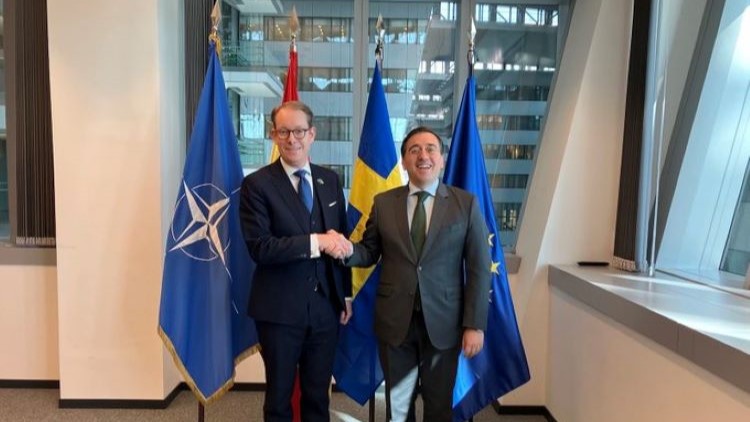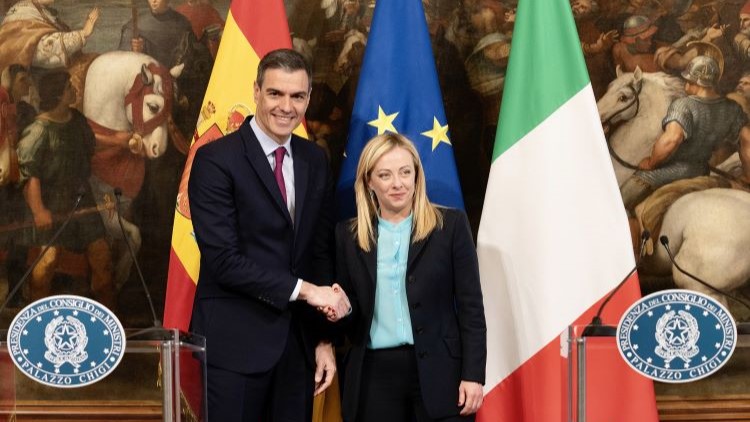The Diplomat
Foreign Minister José Manuel Albares said yesterday in Brussels that Prime Minister Pedro Sánchez is not considering the possibility of succeeding Jens Stoltenberg as head of NATO and warned that any rumors to that effect are “completely far-fetched speculation.”
“President Sánchez is going to exhaust the legislature, he is going to be the PSOE candidate for the presidency of the Government and he is going to win the elections again,” Albares told the press at the end of the NATO ministerial meeting at NATO headquarters in Brussels. Therefore, “what can be expected is that the next legislature will be with President Sánchez as President of the Government, and any other scenario is a speculation that I would describe as completely far-fetched and has no basis whatsoever”, he added.
According to the minister, during the Brussels meeting, which began on Tuesday and concluded yesterday, “there has been no talk at any time, either in the corridors or inside the room,” about the succession of the current NATO secretary general, Jens Stoltenberg, whose term of office will end next October, although the possibility of extending it is not ruled out.
Allied sources have indicated to the agencies that Pedro Sánchez has a good image among the allies, but they have also specified that there are other possible candidates to succeed Stoltenberg, such as the Prime Minister of the Netherlands, Mark Rutte; the Prime Minister of Estonia, Kaja Kallas; or the President of Romania, Klaus Iohannis. In this regard, Albares did not want to pronounce on which would be the Government’s preferred candidate. “Spain is not in that yet,” he declared.
On the other hand, Albares disagreed yesterday on the aggressive tone shown by Jens Stoltenberg towards China during the meeting with the Indo-Pacific partners (Australia, Japan, New Zealand and the Republic of Korea) and with the European Union, in which he warned that “any provision of lethal aid by China to Russia would be a historic mistake with profound implications” and even stated that “what is happening today in Europe, could happen tomorrow in East Asia”.
In this regard, the Spanish minister reiterated (as did Pedro Sánchez during his recent trip to Beijing to meet with Chinese President Xi Jinping) Spain’s “desire” that China, “a permanent member of the Security Council” of the UN, “contribute to world peace and stability” and “use that influence it has over Vladimir Putin so that the war ends immediately and peace returns to Ukraine.” “We are all working with China in that direction” and on other issues where Beijing’s cooperation is needed, such as arms control or the fight against climate change, Albares continued. This message was “a constant in all the interventions” of the rest of the allied ministers, said the minister, who during the meeting with the Indo-Pacific partners reported precisely on Sánchez’s trip to Beijing.
Likewise, the Foreign Minister assured, also in response to Stoltenberg, that “in international relations it is not convenient to make political fiction and, at this time, there is no indication that the situation in Ukraine, which is a situation of open and large-scale conventional war, could be reproduced in the Indo-Pacific“.
Meetings with his Swedish counterpart and Kuleba
José Manuel Albares, who on Tuesday attended with his counterparts the flag-raising ceremony of Finland as the 31st member of the Alliance, yesterday held a bilateral meeting with Tobias Billström, Foreign Minister of Sweden, the other country aspiring to join NATO after receiving the approval of the rest of the allies (except, for the moment, Turkey). “We discussed Sweden’s upcoming NATO membership, which we hope will materialize as soon as possible,” the minister said about this meeting via his official Twitter account. “Very good meeting today with dear colleague José Manuel Albares on the subject of Sweden’s NATO accession and on support for Ukraine. Thank you Spain for your efforts!”, Billström stated via the same social network.
Separately, Albares met on Tuesday with Ukrainian Foreign Minister Dmytro Kuleba, with whom he discussed “the situation on the ground and the upcoming Spanish EU Presidency regarding Ukraine.” Kuleba participated on Tuesday, in the context of the ministerial, in a meeting of the NATO-Ukraine Commission, where the allies reaffirmed “their strong support for Ukraine” and developed, in Stoltenberg’s words, a “multi-year initiative to help ensure deterrence and defense of Ukraine, transition Soviet-era equipment and doctrines to NATO standards, and increase interoperability with NATO.” This was the first meeting attended by Finland as a full member.







